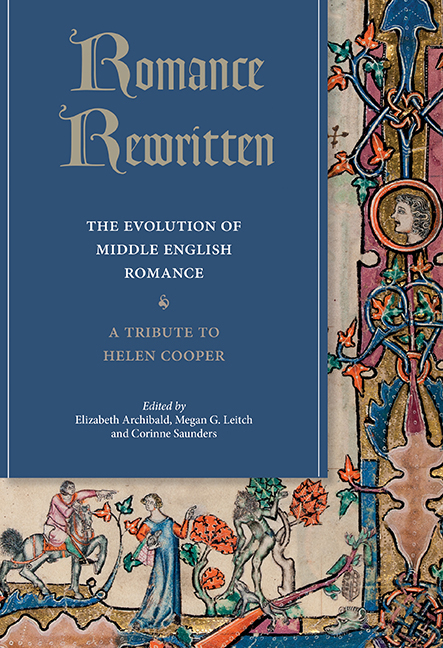Book contents
- Frontmatter
- Dedication
- Contents
- Notes on Contributors
- Acknowledgements
- Introduction. Middle English Romance: The Motifs and the Critics
- I Romance Disruptions
- 1 Medieval Romance Mischief
- 2 Rewriting Chivalric Encounters: Cultural Anxieties and Social Critique in the Fourteenth Century
- 3 Malory's Comedy
- II Romance and Narrative Strategies
- III Romance and Spiritual Priorities
- IV Late Romance
- Works Cited
- Index
- Volumes Already Published
1 - Medieval Romance Mischief
from I - Romance Disruptions
Published online by Cambridge University Press: 17 October 2019
- Frontmatter
- Dedication
- Contents
- Notes on Contributors
- Acknowledgements
- Introduction. Middle English Romance: The Motifs and the Critics
- I Romance Disruptions
- 1 Medieval Romance Mischief
- 2 Rewriting Chivalric Encounters: Cultural Anxieties and Social Critique in the Fourteenth Century
- 3 Malory's Comedy
- II Romance and Narrative Strategies
- III Romance and Spiritual Priorities
- IV Late Romance
- Works Cited
- Index
- Volumes Already Published
Summary
This chapter is about the discomforts involved in reading medieval romance: the edginess, unpredictability and discord that at least some medieval romance texts seem to cultivate. That might seem like an unpromising line of enquiry. After all, there are many general accounts of romance as a genre that describe it as a cultural product of a deeply reassuring kind, fundamentally patterned and predictable, ideologically conservative, morally normative and unashamedly aimed at the provision of certain kinds of wish-fulfilment fantasy. Perhaps the classic version of this view is the one offered by Northrop Frye, in his influential Anatomy of Criticism. His description of literary romance begins with the assertion that: ‘The romance is the nearest of all literary forms to the wishfulfilmentdream.’ Frye goes on to argue that romance is fundamentally ‘dialectical’, by which he means that as an imaginative mode it typically divides the world into poles of good and evil, with the result that, so far as characterisation goes:
subtlety and complexity are not much favored. Characters tend to be either for or against the quest. If they assist it they are idealized as simply gallant or pure; if they obstruct it they are caricatured as simply villainous or cowardly. Hence every typical character in romance tends to have his moral opposite confronting him, like black and white pieces in a chess game.
These elemental tendencies that Frye perceives in romance suit his larger argument, which is that romance itself is elemental: a primal and persistent mode, a kind of cultural building-block and, in effect, a literary archetype. Indeed, his account of romance is designed to demonstrate the validity of what he calls ‘archetypical’ criticism, and the implication of this distinctly Jungian language is that romance is a structural element in human culture because it is also a structural element in the human mind. Certainly, of all literary genres, romance is perhaps the one most prone to being treated as if were some sort of psychological condition or neurosis: a form of discourse all the more meaningful for expressing all sorts of things that are not entirely under the control of those who write it, or indeed of those who read it.
- Type
- Chapter
- Information
- Romance RewrittenThe Evolution of Middle English Romance. A Tribute to Helen Cooper, pp. 27 - 48Publisher: Boydell & BrewerPrint publication year: 2018



